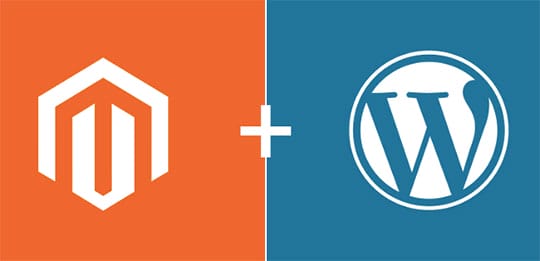The success of your online store depends largely on which platform you have chosen to develop the website. One of the most common questions that web-developers face every day is whether to choose WordPress or Magento. Most web developers consider factors such as the type of business, design complexity, and client requirements, among others, before making their choice.
Whether developing a blog site or an e-commerce website, every developer faces the question of using WordPress or Magento once in their life. Choosing the right CMS platform can make a world of difference in the feel and effectiveness of your end product. With both Magento and WordPress having their own benefits, it can be frustrating to choose one.
That’s where we come in! We compared Magento and WordPress both for you to find out which platform you should choose in 2020. Keep reading!
WordPress

What started as a mere blogging platform is now a full-fledged system where you can manage your content with thousands of plugin and theme options. The platform lets you create blogs, websites, mobile applications, and any other type of website you want. Reputable businesses like eBay and The Newyorker have been developed on WordPress too.
Your search engine rankings don’t entirely depend on the platform you are using, but it gives you a solid foundation to begin your work from. It also has some of the best plugins that make your website search engine friendly. WordPress is one of the simplest platforms to start posting your content. You can not only incorporate various features to your website but can also use unique extensions.
What makes it even better is that there is absolutely no fee for it, and it has no hidden charges. It costs nothing since it is an open-source project. Moreover, you can choose from thousands of free themes for your website.
WordPress is beginner-friendly and can enable everyone to create their own business successfully, whether they are tech-friendly or not. The features of WordPress let you take control of the website without creating or editing any code. It’s easy for users to quickly find their way around and get the hang of it.
Recommended for you: How to Build Consistent Web Experience with WordPress?
Magento

Magento, on the other hand, is one of the most popular e-commerce systems. The system has created over 0.1 million online stores so far and has been downloaded 2.5 times. It provides two platforms to users;
- Magento Open Source, which is a free version that can be customized and self-hosted.
- Magento Commerce, which is a premium version that includes a subscription fee. It has proved to be a popular choice of e-commerce brands.
Magento Adobe Experience cloud gathers all your marketing requirements in one place so you can manage your content, deliver campaigns, automate ads, and much more using the integrated approach. It also integrates the physical shopping experience with digital providing a happy experience to the customers.
The advantage of Magento is that everyone can contribute to product development. It lets users expand the functionality with the help of professionals. Magento Commerce not only provides you more advanced features such as targeted promotions, but it also gives you the option of using advanced marketing features.
However, there are several things you have to consider before making it your go-to platform, such as the ongoing costs of integrations, and how it stacks against other platforms. If you are a newbie, managing and handling Magento could be a daunting task for you because of the complex designing tools it offers. Moreover, the platform has some limitations in terms of flexibility since it only supports e-commerce businesses.
Magento vs WordPress: The Similarities

When it comes to having interactive, feature-rich websites, both the platforms are incredible. They share the same basic features, as both the platforms are SEO friendly, have a vast community, and can be customized easily.
Both the platforms are open-source and have multiple plugins and extensions to help you customize or enhance your website. Having said that, both platforms were developed for different target users and objectives.
Magento vs WordPress: The Differences

Both Magento and WordPress are content management systems, but the difference lies in the intended purpose. Firstly, Magento is aimed at e-commerce businesses, and WordPress is geared towards content management. All WordPress files are contained in one folder but with a unique name, but all Magento files are set up on several files with the same name.
Moreover, WordPress is driven by PHP, and Magento is, for the most part, object-oriented. Magento has CMS blocks and widgets that offer high functionality, whereas WordPress has widgets that control design in a template.
Magento’s functions, such as managing customer lists, providing shipping methods, reporting sales, and managing revenue, is designed to facilitate e-business websites. On the other hand, if you are looking to just introduce your business to people, without the aim of selling, then WordPress is the perfect choice for you. It’s suitable for anyone who wants to create a business presence online, and can best be used for personal blogs, official websites, and informational websites, etc.
When it comes to the ease of usage, Magento is much more complicated than WordPress, but that could be because it is more professional and offers out-of-the-box features to users.
Experts recommend Magento Development Services for e-commerce and WordPress development services for corporate websites, blogs, and other websites of the non-selling nature.
You may like: Magento PWA Studio: The Progressive Web App Tool for Magento!
Comparison #1: Ease of Use

- WordPress: WordPress is beginner-friendly and can enable everyone to create their own business successfully, whether they are tech-savvy or not. The features of WordPress let you take control of the website without creating or editing any code. It’s easy for users to quickly find their way around and get the hang of it.
- Magento: As Magento is specially built for e-commerce websites, it involves coding and is slightly more complicated than WordPress. The learning curve is quite steep if you are just starting. The technical terms on the platform might be intimidating for those who are not confident about their computing knowledge. Beginners might face challenges because of the sophisticated designing tools of the platforms as well. But there are several extensive user guides available on the internet if you ever get stuck.
Comparison #2: Purpose

- WordPress: WordPress is a suitable platform for those who are either working on a blog or a personal website. It supports simple functions such as payment options, tracking the orders, and shipping, etc. So, if you are a beginner and want a small store, WordPress is an excellent option for you.
- Magento: On the other hand, if you are looking for a store that lets you sell as many products as you want with more features and more options, then Magento is just the right platform for you. Using the advanced features of Magento, you can also build a marketplace with multiple vendors.
Comparison #3: Website Development

- WordPress: Developing a website on WordPress can be super easy, all thanks to its framed plugins and widgets. The plugins are easy to install and enable simple options to add to the website and customize as well. All these features and the flexibility it offers makes it an easy to figure website.
- Magento: Magento, on the other hand, can be complicated to learn because it is object-oriented. The technical approach of the website requires knowledge of programming and coding. If you are not from a technical background, you may have to hire someone to do all this for you. However, the Magento forum has every information you may need to solve your problems.
Comparison #4: Security

- WordPress: Security issues are inevitable in platforms like WordPress because not customers are careful about their websites. The platform tries its best to push out patches to every new issue, but there’s only so much they can do for insecure or old setups. As WordPress uses many plugins to provide you new and improved features, it also makes it vulnerable to cyber-attacks. According to different sources, about 75% of issues in WordPress security arise from the plugins, and only 14% arise from the core website.
- Magento: In terms of security, the built-in features of Magento keep your website safe from major threats. E-commerce websites are attractive targets for hacking because of personal information and can have long-term negative consequences for customers. However, Magento’s security scan tools monitor your sites for risks and detect unauthorized access using their scan feature. Moreover, it updates and enhances the security system now and then to protect the customer.
You may also like: All You Should Know About Magento 2 Multi-Source Inventory.
Magento vs WordPress: Conclusion

In a nutshell, one-size does not fit all. While Magento is more robust, WordPress is better for people who are focusing on content or blogging. Magento is an E-commerce solution for people who are looking to sell products online through a web store. If you are more content-oriented, then WordPress may be the ideal platform for you as it is a paradise for bloggers.
We hope the information above helped you figure out which platform you should use from the two for your website. Let us know!
This article is written by Noman Ali. Noman provides ghostwriting and copywriting services. His educational background in the technical field and business studies helps him in tackling topics ranging from career and business productivity to web development and digital marketing. He occasionally writes articles for Dynamologic Solutions.





